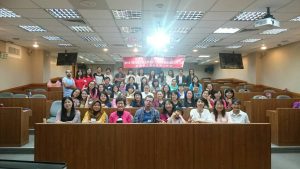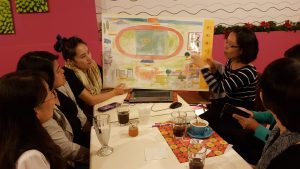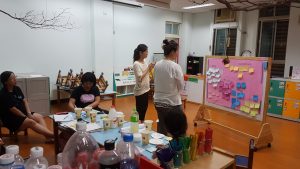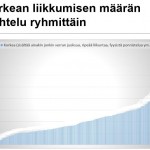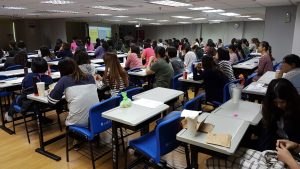 The workshop in Taipei on Sunday 20 November collected together the teachers, who had participated in the observation and data collection. The main content of the day was the sharing of teachers experiments and examples of their development models based on the research results. Many of the development tasks were related to outdoors and physical activity. Taipei is a cramped metropolitan, in where the pre-schools may not have a proper outdoor yard of their own. It was very inspiring to see creative solutions for fun and creative physical activity in constricted environment. Of the participating researchers were included, for example, Hui-Chun Lee (Tzu Chi University), professor Li-Chen Wang (Chang Gung University), professor Doris Cheng (Tung Wah Collegesta Hong Kong) and professor Karen Liu (Indiana State University). As an example, in Sanmin pre-school, the children go to the park every day. The group collects smiles from the people they meet in their way. They get smiles a lot! There were people waiting for the children to pass by. For example, a choir of senior citizens were waiting for the children and performed a song for the children. In the park the activities were fast, but the path to park and back took a long time, because there were so many familiar and unknown things to explore.
The workshop in Taipei on Sunday 20 November collected together the teachers, who had participated in the observation and data collection. The main content of the day was the sharing of teachers experiments and examples of their development models based on the research results. Many of the development tasks were related to outdoors and physical activity. Taipei is a cramped metropolitan, in where the pre-schools may not have a proper outdoor yard of their own. It was very inspiring to see creative solutions for fun and creative physical activity in constricted environment. Of the participating researchers were included, for example, Hui-Chun Lee (Tzu Chi University), professor Li-Chen Wang (Chang Gung University), professor Doris Cheng (Tung Wah Collegesta Hong Kong) and professor Karen Liu (Indiana State University). As an example, in Sanmin pre-school, the children go to the park every day. The group collects smiles from the people they meet in their way. They get smiles a lot! There were people waiting for the children to pass by. For example, a choir of senior citizens were waiting for the children and performed a song for the children. In the park the activities were fast, but the path to park and back took a long time, because there were so many familiar and unknown things to explore.
